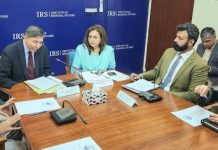ISLAMABAD, Jul 25 (DNA):The 179th meeting of the Inter Boards Coordination Commission (IBCC) was successfully concluded here the other day with key decisions aimed at transforming Pakistan’s examination and assessment systems. Organized by the Board of Intermediate and Secondary Education (BISE) Peshawar on Thursday, the meeting was hosted by the Khyber Pakhtunkhwa Boards Committee of Chairmen.
The meeting was chaired by Syed Junaid Ikhlaq, Chairman of the Federal Board of Intermediate and Secondary Education (FBISE) and Senior Joint Secretary at the Ministry of Federal Education and Professional Training, which gathered representatives from examination boards nationwide.
The primary focus of the meeting was on modernizing and standardizing examination systems to enhance the quality of education and ensure fair assessment practices across Pakistan. Historically, the education system in Pakistan has faced challenges such as disparities in quality, regional imbalances, and inconsistent standards across educational boards.
The current assessment systems have been criticized for emphasizing rote learning over critical thinking and problem-solving skills.
Recognizing these issues, the Forum endorsed the proposal to formulate the National Assessment Framework. This framework marks a significant step in the country’s educational progress, demonstrating a collective commitment to improving education quality and providing equal learning opportunities for all students.
The National Assessment Framework will serve as a comprehensive guide for implementing a robust student assessment system that meets international standards while respecting Pakistan’s unique cultural and academic contexts.
In 2022, the Forum unanimously decided to adopt a new grading system to replace raw marks, aiming to reduce intense competition among students for the highest marks. Although its implementation was delayed due to pending approvals from provincial BISE authorities, recent discussions have prioritized its execution for the annual examinations of 2025.
Annually, the IBCC organizes a summer camp for top achievers from all BISEs. This year, the Chairman of BISE Benazir Abad has been appointed as the focal person to organize the summer camp on behalf of the Sindh Boards Committee of Chairmen. The event will be held in the scenic valleys of Kaghan and Naran, with support from KPBCC.
Also, the Federal Education Ministry officially announced the National Curriculum of Pakistan for 2023. The provincial curriculum authorities have endorsed this curriculum, which aims to standardize education, ensure consistent learning outcomes, and improve education quality nationwide. This initiative is expected to bridge educational disparities between urban and rural areas, promote national cohesion, and provide students with a modernized curriculum aligned with international standards.
The Forum also commended the Sindh Government’s decision to conduct SSC/HSSC examinations in March/April, aligning with other provincial boards’ schedules. This uniform academic calendar will protect students from harsh weather conditions during exams and synchronize board results with university admissions.
Syed Junaid Ikhlaq expressed his appreciation for the collaborative efforts of all participants, emphasizing the importance of these reforms in shaping the future of education in Pakistan. Dr. Ghulam Ali Mallah, Executive Director IBCC, highlighted the goal of creating a fair, transparent, and efficient examination system that accurately reflects students’ capabilities. He noted that the decisions made in this meeting represent significant progress toward this objective.

















